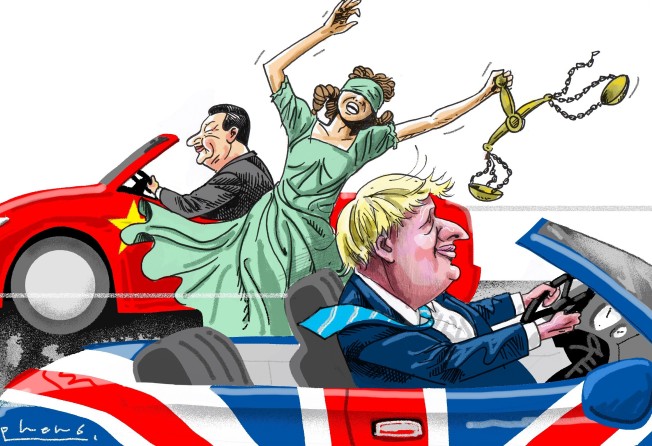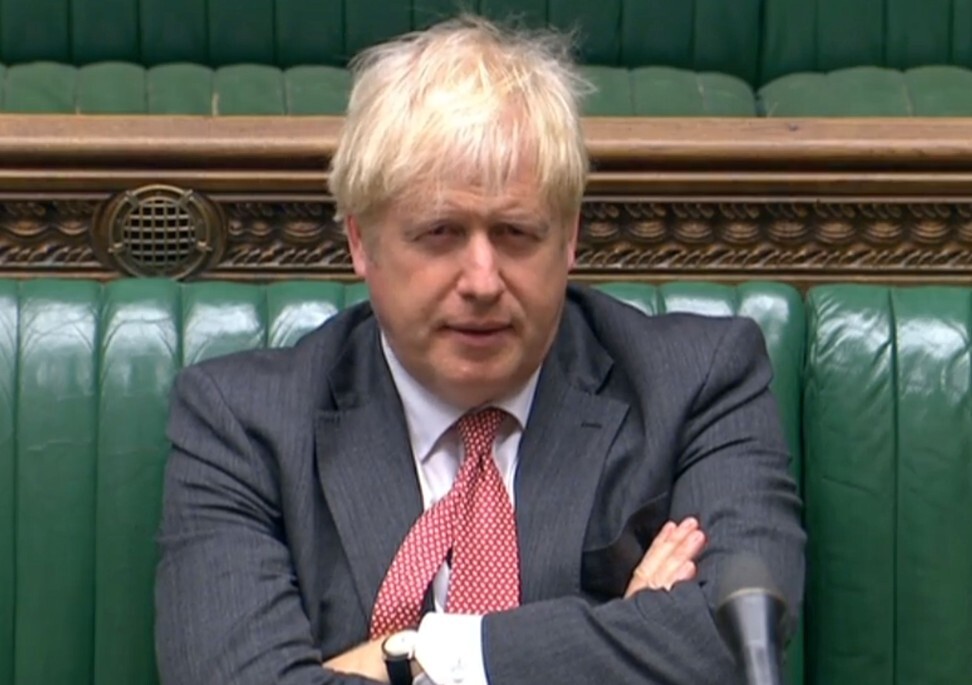Why Boris Johnson’s backtrack on the EU deal is a moral mistake
- If Britain could pass legislation in flagrant disregard of treaty commitments it made only eight months ago, who is it to admonish China for imposing a law on Hong Kong that China considers essential to its sovereignty?

Since moving back to Britain as a British National (Overseas) a month ago, I have been struck by British news channels’ tendency to focus incessantly each week on one or two small issues, such as the government’s mishandling of school exam results, as if they were major crises. I say to my friends here that they are very fortunate Britain is constantly beset with small problems. An issue that can be fixed, unlike the one that has befallen Hong Kong, is by definition a small issue.
Certain fundamental matters do guide British politics. Britain’s relationship with the European Union has always been as fraught and full of competing interests as Hong Kong’s relations with China. In June 2016, 72.2 per cent of the British electorate voted in a nationwide referendum in which a simple majority decided Britain should leave a club where it seemed the perennial outsider.
A Hong Kong émigré could only look with envy upon this democratic exercise, and it is absolutely right that the referendum result should be implemented. However, as Britain’s Brexit transitional arrangement with the EU expires at the end of December and negotiations for a free trade deal are heading nowhere, British Prime Minister Boris Johnson is pushing an internal market bill that, if passed, will breach the Brexit withdrawal agreement, signed in January, and international law.
The bill has lasting repercussions for Britain’s reputation as a state that respects the sanctity of treaties and the rule of law. Arguments the British government has advanced for the bill are disingenuous, and dangerously reminiscent of those Beijing uses to justify its national security law for Hong Kong.
The British government considers the bill necessary to address the stalemate over preventing a hard border between Northern Ireland, a sovereign part of the United Kingdom, and the Republic of Ireland, an EU member. In the absence of a free trade deal, the Northern Ireland protocol enshrined in the Brexit withdrawal agreement becomes operative as of 2021.
EU tariffs will be levied on goods from the rest of Britain to Northern Ireland that are deemed “at risk” of subsequent transport to and sale in the Republic of Ireland. EU state aid rules, in which Britain no longer has a say, will continue to apply to goods related to Northern Ireland, impacting Britain’s internal market as a whole.
Johnson hailed the protocol as a breakthrough as he sought a majority in the general election last December. But now the government argues that the EU could “carve up” the UK through the Northern Ireland protocol, parts of which the internal market bill would “disapply” in order to protect the country’s territorial and economic integrity. It admits that the bill, if passed, will break international law “in a very specific and limited way”.
The attorney general and the solicitor general conclude that “there is a strong legal basis, supported by authorities, which separates the rule of law into its domestic and international spheres”. The rule of law, by which ministers have an overarching duty to abide, pertains to British domestic law only, despite a 2018 Court of Appeal ruling that it encompasses international law.

In short, Parliament is supreme in Britain, and the rule of law is intact even when Britain breaks international law. The fast-tracked bill had its second reading in the House of Commons on Monday, five days after it was introduced. Sounds all too familiar to Hong Kong ears?
Parliamentary sovereignty has been the foundational principle of Britain since the Glorious Revolution of 1688. The British desire to reassert Britain’s sovereignty, free from EU constraints, drove the 2016 referendum.
State sovereignty similarly serves as the bedrock of Chinese foreign policy, and one of the most sacrosanct principles of international legal order in its current form. Still, this does not mean Britain, China or any other state can do whatever it wishes without constraints.
It is a principle well established in international law, as codified in Article 27 of the 1969 Vienna Convention on the Law of Treaties, that a state may not disregard its international obligations just because its domestic law allows or dictates otherwise. The British government’s attempt to evade its international obligations undermines Britain’s political and moral standing to hold other states and governments to account under international law.
If Britain could pass legislation in flagrant disregard of treaty commitments it made only eight months ago, who is it to admonish China for imposing a law on Hong Kong that China considers essential to its sovereignty, notwithstanding the 1984 Sino-British Joint Declaration that China regards as “a historical document that no longer has any realistic meaning”?

04:30
Independent bookstores struggle under national security law in Hong Kong
If British ministers need to abide by British domestic law only, who are they to criticise Chief Executive Carrie Lam Cheng Yuet-ngor and Hong Kong police for their “very specific and limited” crackdown on Hongkongers’ exercise of internationally guaranteed rights?
Trust, once lost, can never be regained. Dominic Raab, the British foreign secretary, stated in July: “It’s a matter of trust, and lots of countries around the world are asking this question – does China live up to its international obligations? Because if they can’t be trusted to keep their word on Hong Kong, why would they be trusted to live up to their wider international responsibilities?”
The British government must urgently ask itself the same question. The rule of law must never be treated as a bargaining chip or political tool, in Britain, in Hong Kong, anywhere. Hong Kong provides very useful, and poignant, lessons.
Phil C.W. Chan is author of China, State Sovereignty and International Legal Order. He is working on his fourth book, When Liberalism, Authoritarianism and Rule of Law Collide: The Tragedy of Hong Kong, on contract for publication in early 2021